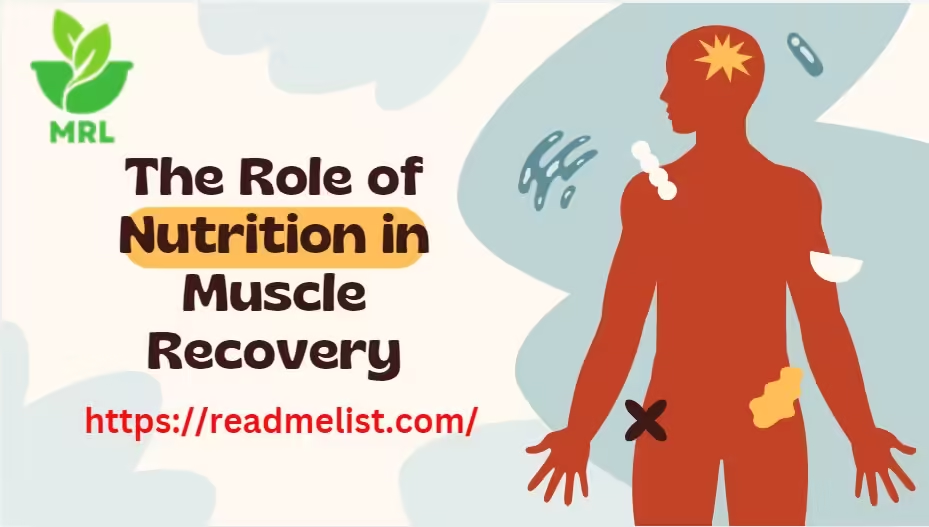—When it comes to fitness, most people focus on the actual workout, but what you do after the workout is just as important. Nutrition plays a critical role in muscle recovery, helping repair tissues, reduce soreness, and prepare the body for future workouts. Whether you’re lifting weights, running, or doing intense HIIT, properly fueling your body post-exercise is essential for building strength and optimizing recovery.
In this article, we’ll explore how the right nutrition can aid progress.
1. The Importance of Muscle Recovery
When you work out, especially during strength training, your muscles endure tiny tears. This process is completely normal and necessary for muscle growth, but without proper recovery, your body can’t repair those muscles efficiently. This can lead to prolonged soreness, fatigue, and even injury.
Nutrition plays a central role in this recovery process. The food you eat after exercise replenishes depleted energy stores, repairs muscle fibers, and helps reduce inflammation. By providing your body with the right nutrients, you can speed up recovery and improve performance.
2. Key Nutrients for Muscle Recovery
Several nutrients are essential for muscle recovery. Let’s break down the most important ones:
a. Protein: The Building Block of Muscle Repair
Protein is crucial for repairing and rebuilding muscle tissue. During exercise, muscles are broken down, and protein provides the amino acids needed to repair these tissues and promote growth.
- Why it’s important: Consuming enough protein post-workout helps your muscles recover faster and reduces soreness.
- Sources: Lean meats, fish, eggs, dairy products, plant-based proteins (tofu, lentils, beans), and protein supplements.
Note: Aim for 20-30 grams of protein within 30-60 minutes post-workout for optimal muscle repair.
b. Carbohydrates: Refuel and Replenish Energy
Carbohydrates are your body’s main source of energy. After a workout, your glycogen stores (the energy stored in muscles) are depleted. Replenishing these stores with carbohydrates is crucial for recovery, especially after intense or prolonged exercise.
- Why it’s important: Restoring glycogen levels helps prevent fatigue and provides energy for future workouts.
- Sources: Whole grains, fruits, sweet potatoes, oats, quinoa, and rice.
Note: Combine carbs with protein in your post-workout meal for better glycogen replenishment and muscle repair.
c. Fats: Supporting Hormone Production and Reducing Inflammation
While fats are often overlooked in the context of muscle recovery, they play a role in hormone production and help reduce inflammation. Healthy fats, in particular, can support the body’s recovery process.
- Why it’s important: Consuming healthy fats can help regulate hormone levels and combat inflammation caused by intense exercise.
- Sources: Avocados, nuts, seeds, olive oil, fatty fish (like salmon), and flaxseeds.
Note: Incorporate healthy fats into your diet, but focus on lean protein and carbs immediately post-workout, as fats can slow digestion.
3. Hydration: An Essential Component of Recovery
Proper hydration is a key part of recovery that’s often underestimated. During exercise, you lose water and electrolytes through sweat, which need to be replenished for your muscles to function properly.
- Why it’s important: Dehydration can lead to muscle cramps, fatigue, and delayed recovery. Staying hydrated helps transport nutrients to muscles and remove metabolic waste.
- How to stay hydrated: Drink water throughout the day and after your workout. In cases of intense or long-duration exercise, consider electrolyte drinks to replenish lost minerals like sodium, potassium, and magnesium.
Note: Monitor the color of your urine—if it’s dark, you may need more fluids!
4. Timing Your Nutrition for Optimal Recovery
The timing of your nutrition is just as important as what you eat. Consuming the right nutrients immediately after exercise, especially protein and carbohydrates, can kickstart the recovery process.
- The anabolic window: This refers to the 30-60 minute period post-workout when your muscles are most receptive to absorbing nutrients. Eating a combination of protein and carbs during this window enhances glycogen replenishment and muscle repair.
Example post-workout meals:
- Grilled chicken with brown rice and vegetables.
- Greek yogurt with mixed berries and honey.
- Protein shake with a banana and almond butter.
5. The Role of Supplements in Muscle Recovery
While whole foods should always be your primary source of nutrients, supplements can help fill gaps and speed up recovery, especially for active individuals or athletes.
- Protein supplements: Whey or plant-based protein powders are a quick and convenient way to ensure you’re getting enough protein post-workout.
- BCAAs (Branched-Chain Amino Acids): BCAAs are a group of essential amino acids (leucine, isoleucine, and valine) that help reduce muscle soreness and promote recovery.
- Creatine: Creatine supports muscle recovery by replenishing energy stores (ATP) and helping with strength gains.
- Glutamine: This amino acid helps support immune function and muscle recovery after intense exercise.
Note: Always consult a healthcare professional before adding new supplements to your routine.
6. Anti-Inflammatory Foods for Faster Recovery
After a tough workout, your muscles may become inflamed. Incorporating anti-inflammatory foods into your diet can help reduce muscle soreness and speed up the recovery process.
- Top anti-inflammatory foods:
- Fatty fish (rich in omega-3s)
- Turmeric (curcumin)
- Ginger
- Leafy greens (spinach, kale)
- Berries (blueberries, strawberries)
- Nuts (especially walnuts)
Note: Adding these foods to your diet regularly can help reduce exercise-induced inflammation and improve recovery time.
7. Avoiding Common Nutritional Pitfalls
When it comes to muscle recovery, it’s not just about what you should eat—it’s also about what to avoid.
- Skipping meals: Failing to eat after a workout can delay recovery and lead to muscle breakdown.
- Overconsumption of processed foods: High-sugar and processed foods can promote inflammation and interfere with recovery.
- Inadequate protein intake: Without enough protein, your muscles won’t recover as quickly, and you may not see the strength gains you’re aiming for.
Read More…

